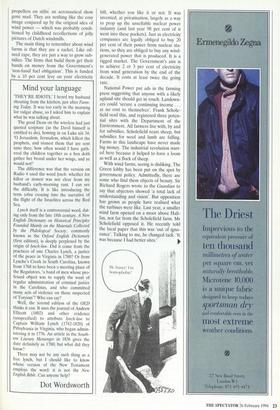Mind your language
'THEY'RE IDIOTS,' I heard my husband shouting from the kitchen, just after Farm- ing Today. It was too early in the morning for vulgar abuse, so I asked him to explain what he was talking about.
The good Dean on the wireless had just quoted scripture (as the Devil himself is entitled to do), homing in on Luke xiii 34: '0 Jerusalem, Jerusalem, which killest the prophets, and stonest them that are sent unto thee; how often would I have gath- ered thy children together as a hen doth gather her brood under her wings, and ye would not!'
The difference was that the version on Radio 4 used the word lynch: whether for killest or stonest was not clear from my husband's early-morning rant. I can see the difficulty. It is like introducing the term zebra crossing into the narrative of the flight of the Israelites across the Red Sea.
Lynch itself is a controversial word, dat- ing only from the late 18th century. A New English Dictionary on Historical Principles Founded Mainly on the Materials Collected by the Philological Society, commonly known as the Oxford English Dictionary (first edition), is deeply perplexed by the origin of lynch-law. Did it come from the practices of one Charles Lynch, a justice of the peace in Virginia in 1780? Or from Lynche's Creek in South Carolina, known from 1768 to have been a meeting place of the Regulators, 'a band of men whose pro- fessed object was to supply the want of regular administration of criminal justice in the Carolinas, and who committed many acts of violence on those suspected of Toryism'? Who can say?
Well, the second edition of the OED thinks it can. It uses the journal of Andrew Ellicott (1802) and other evidence (unspecified) to attribute lynch-law to Captain William Lynch (1742-1820) of
Pittsylvania in Virginia, who began admin- istering it in 1776. An article in the South- ern 'Literary Messenger in 1836 gives the date definitely as 1780; but what did they know?
There may not be any such thing as a free lynch, but I should like to know whose version of the New Testament employs the word: it is not the New English Bible. Can anyone help?
Dot Wordsworth


























































 Previous page
Previous page